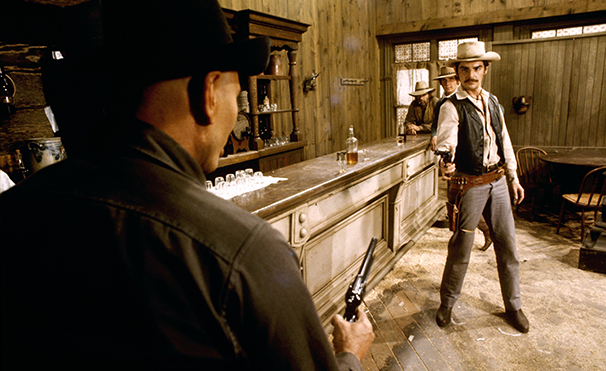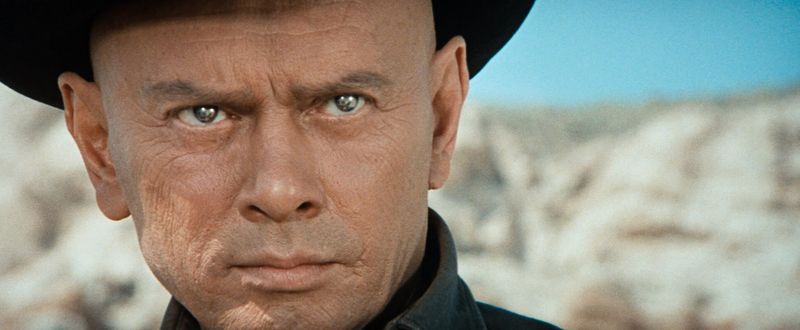
What happens when man’s reach exceeds not just his grasp, but also his common sense? That’s the premise of Michael Crichton’s Westworld, in which visitors go to an amusement park for the experience of a lifetime—and get it.
Welcome to Delos, the resort which promises its guests “the vacation of the future, today”. For a mere $1,000 a day, patrons can spend their holiday in a theme park so sophisticated it’s peopled with robots: machines specifically designed to be indistinguishable from humans and to cater to a visitor’s every whim. There are three parks on offer: Medieval World, a hodgepodge of knights and fairytale chivalry; Roman World, a recreation of Pompeii before Vesuvius erupted; and Western World, the 19th century American frontier. The only rule is that there are no rules. Visitors can do anything they please, no matter how violent or carnal. Everything in the park exists for them.
Peter Martin (Richard Benjamin) and his friend John Blane (James Brolin) are on a trip to Western World (commonly shortened to Westworld). It’s Martin’s first time but Blane is an old hand. They roll into town the old-fashioned way, on a Wells Fargo stage coach, and Blane assures Martin that everything, even Martin’s uncomfortable hotel bed, is an authentic recreation of the West of the 1880s. Ironic really, since the town and its inhabitants seem more like clichés drawn from a collective memory of film and TV Westerns.
The two men walk into the saloon and order drinks, but Martin still feels silly, a grown man wearing a cowboy outfit. Then the Gunslinger (Yul Brynner) saunters in and picks a fight with him. Even with Blane whispering in his ear, Martin still struggles to overcome his instinct to walk away. Finally he shoots the Gunslinger in the chest. Crichton shows the robot falling in slow-motion, blood dripping from his wound, as Martin shoots him again and again and again. At last he falls down dead—except he was never alive. Martin’s guilt gives way to elation as he realises his victim was just a machine: he’s free to enjoy the thrill of murder, without remorse or reproach.
Martin’s fantasy is a manufactured one, supported by an army of technicians who keep the park running. They appear at night, dressed in black like stagehands at a kabuki theatre, clearing up the day’s debris and tending to the robots in a hidden underground laboratory. The machines are breaking down more than usual. In perhaps the earliest cinematic reference to a computer virus, one of the lead scientists suggests the faults are like an infection spreading from android to android. He raises the matter with his colleagues, only to be told he is overreacting. This is Delos, where nothing can go wrong.

Westworld is a story of man’s hubris. In their headlong pursuit of progress, Delos’ scientists (and the society that produced them) have acquired knowledge without wisdom and created complex beings they do not fully understand. Worse, they concentrate on the ‘artificial’ while ignoring the ‘intelligence’, treating the androids as objects and subjecting them to continuous abuse—slaves in service of humanity’s basest desires. The word ‘robot’ first appeared in 1920, when Czech playwright Karel Čapek introduced it in his play R.U.R. or Rossum’s Universal Robots, about a company manufacturing drudges to do the work humans didn’t want to. It’s derived from the Old Church Slavonic ‘rabota’, meaning forced labour.
Čapek’s robots rebelled against their masters; it’s no surprise when the park becomes a glorified death trap.
Of all the robots running amok, none symbolizes their rage better than the Gunslinger. Dressed in an identical all-black outfit, Brynner’s android is a deliberate inversion of Chris, the heroic sharpshooter he played in The Magnificent Seven. The Gunslinger is implacable, inhuman. Martin can’t reason with him; all he can do is try to escape or stop him. Remarkably, Brynner only has a handful of lines; most of the Gunslinger’s characterisation is conveyed by how he holds himself on screen. He walks at a pace as steady as a metronome, his back rigid, his face impassive—a true resident of the Uncanny Valley. His performance is the stuff of nightmares. It’s also the main reason Westworld endures, encouraging audiences to look past the dated technology and effects. The HBO series cleverly escaped Brynner’s shadow by going in the opposite direction: Ed Harris’ Man in Black is human, which also makes him more monstrous.
Westworld is a cautionary tale about pride and where it might lead us. We might build creations in our own image, beings stronger and faster than we are who only learn to imitate our malice and spite. Or perhaps not. We’ll know soon enough. The technology Crichton imagined is almost here.
Leave a Reply